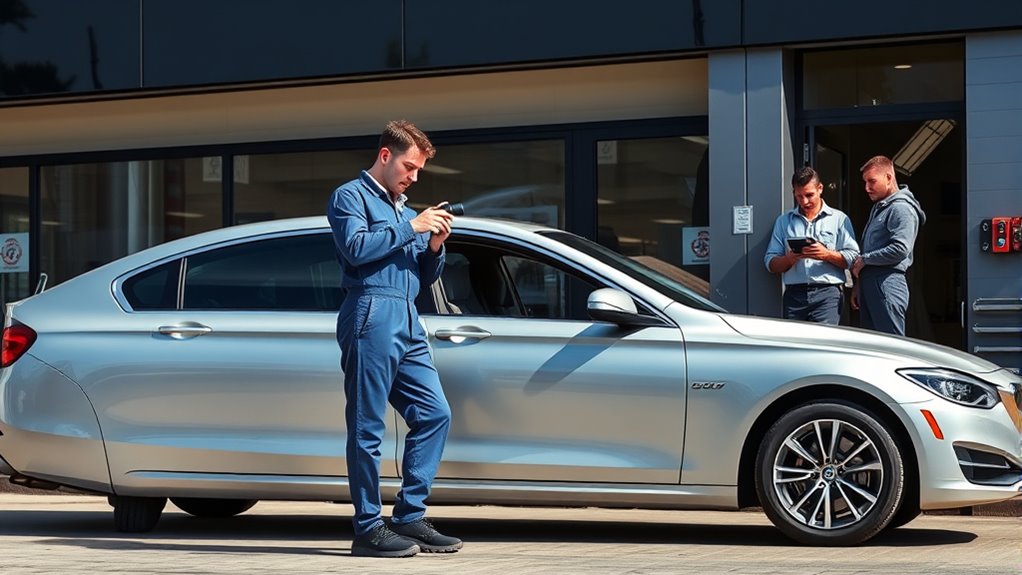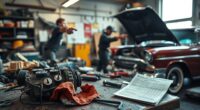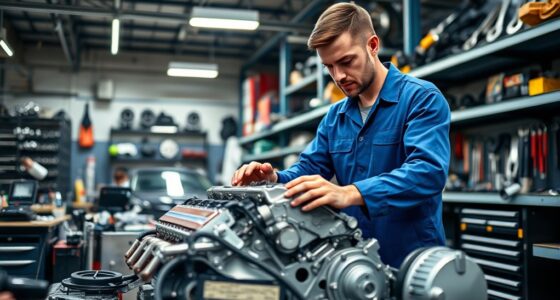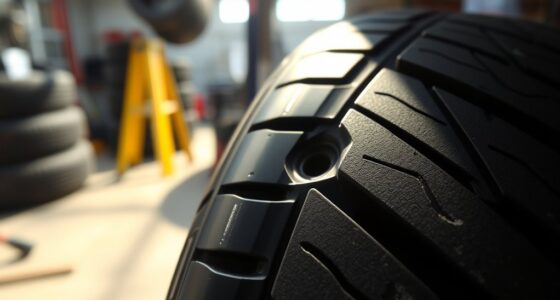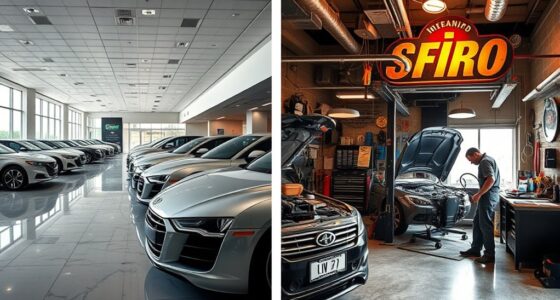Getting a second opinion on car repairs is smart when facing major or costly fixes, or if something doesn’t seem right with the initial diagnosis. It helps confirm if the repairs are necessary, prevent overcharging, and guarantee your safety. Comparing estimates and expert opinions can save you money and avoid unnecessary work. If you want to know the best approach for getting that extra assessment, keep exploring the key steps involved.
Key Takeaways
- Seek a second opinion for major, costly, or safety-related repairs to ensure diagnosis accuracy and appropriate treatment.
- Comparing diagnoses and costs helps confirm the necessity of repairs and prevents overpayment.
- When initial repair estimates seem inflated or inconsistent with ongoing issues, a second opinion can provide clarity.
- Verifying diagnoses through a reputable mechanic can save money and enhance vehicle safety.
- Viewing a second opinion as an informed decision reduces doubts and encourages cost-effective, accurate repairs.
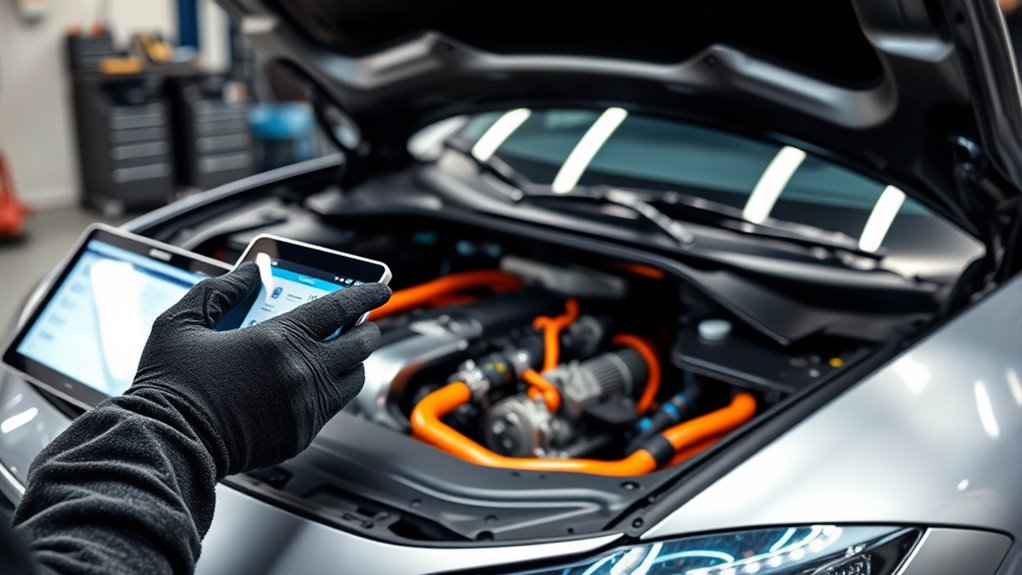
When your car needs repairs, getting a second opinion can save you money and prevent unnecessary work. It’s a smart move, especially when the initial diagnosis doesn’t seem entirely clear or if the repair estimate feels unusually high. A second opinion provides you with an independent assessment of the problem, which can improve diagnostic accuracy and help you understand whether the recommended repairs are genuinely necessary. This step is vital because inaccurate diagnoses can lead to unnecessary repairs, inflated repair costs, or overlooking the real issue altogether.
By seeking a second opinion, you gain insight into whether the repair shop’s diagnosis is correct or if a different approach might be more effective. Sometimes, mechanics may overestimate the severity of a problem or suggest more costly repairs when simpler solutions exist. A second opinion can confirm or challenge the initial assessment, giving you confidence in your decision-making process. It also helps you compare repair costs—what one shop charges versus another—so you can avoid overpaying for services. Knowing the true extent of the problem ensures you’re not shelling out more than necessary, which can add up quickly with complex or expensive repairs.
A second opinion confirms diagnosis accuracy and helps compare costs, preventing overpayment and unnecessary repairs.
You should contemplate getting a second opinion if you’re faced with a major repair, especially when the diagnosis involves critical safety components or expensive parts. If the repair estimate seems inflated or if the suggested work doesn’t align with what you’ve researched, it’s wise to consult another mechanic. Additionally, if your initial diagnosis isn’t clear or if you’re experiencing ongoing issues that don’t seem to match the mechanic’s description, a second opinion can clarify things. It’s also helpful when the repair shop recommends replacing parts that seem unnecessary or when you’re unsure about the longevity of the proposed fix.
Getting a second opinion doesn’t mean doubting your current mechanic’s expertise; it’s about making informed decisions. Sometimes, mechanics will agree on the diagnosis, which provides peace of mind. Other times, they might offer different solutions, giving you options to consider. Remember, your goal is to verify the diagnosis is accurate and that the repair costs reflect the true scope of the work needed. Don’t hesitate to ask for recommendations from friends, family, or trusted online reviews to find reputable mechanics for second opinions. It’s a small step that can lead to significant savings and better repair outcomes, making sure you’re not paying for unnecessary work or risking further damage to your vehicle.
In addition, understanding the role of predictive modeling in diagnosing vehicle issues can help you recognize when a mechanic might be relying on data-driven insights to support their recommendations.
Frequently Asked Questions
How Do I Find a Qualified Mechanic for a Second Opinion?
To find a qualified mechanic for a second opinion, start by researching certified technicians in your area. Check online reviews and ask for recommendations from friends or family. When visiting, request detailed repair estimates to compare with the first opinion. A certified technician can accurately diagnose issues and provide trustworthy advice. Don’t hesitate to get a second opinion if something feels off—it’s your car and your money.
Is It Expensive to Get a Second Opinion on Repairs?
You might wonder if getting a second opinion is costly. Usually, it’s affordable, especially when you compare the cost to the potential savings from accurate repairs. The price varies depending on the mechanic and whether they offer a detailed cost comparison. Plus, a second opinion can verify repair warranties, saving you money long-term. Overall, it’s a smart investment to guarantee you’re not overpaying or missing critical issues.
Can I Get a Second Opinion at the Same Dealership?
Like a detective searching for clues, you can seek a second opinion at the same dealership, but it’s not always straightforward. Dealership policies vary; some may allow you to consult another mechanic, especially if they’re certified and independent. However, others might restrict this to protect their reputation. Always ask about their policies first, ensuring you’re not hitting a dead end before getting that essential second opinion.
How Long Does It Typically Take to Get a Second Opinion?
When you seek a second opinion, it usually takes a few hours to a day, depending on the shop’s diagnostic accuracy and how busy they are. The process involves the mechanic reassessing your car, providing a new diagnosis, and offering a repair estimate. To guarantee you get an accurate comparison, ask about their diagnostic methods and how detailed their estimates are, so you can make an informed decision.
What Should I Do if the Second Opinion Conflicts With the First?
Imagine you’re told your car needs a costly repair, but a second mechanic suggests it’s unnecessary. When opinions conflict, trustworthiness becomes essential. You should gather details, compare diagnoses, and consider each mechanic’s reasoning. If uncertainty persists, seek a third opinion. Trust your instincts and prioritize clear, honest communication. This helps you make confident decisions, ensuring you’re not pressured into costly, unnecessary repairs and feel secure about your choices.
Conclusion
Getting a second opinion on car repairs can save you money and prevent unnecessary work. Studies show that up to 50% of repairs are misdiagnosed, leading to costly and avoidable expenses. By seeking a second opinion, you guarantee you’re not overpaying or being misled. Always take the time to get a second perspective—it’s your best shot at making informed decisions and protecting your wallet on the road ahead.
